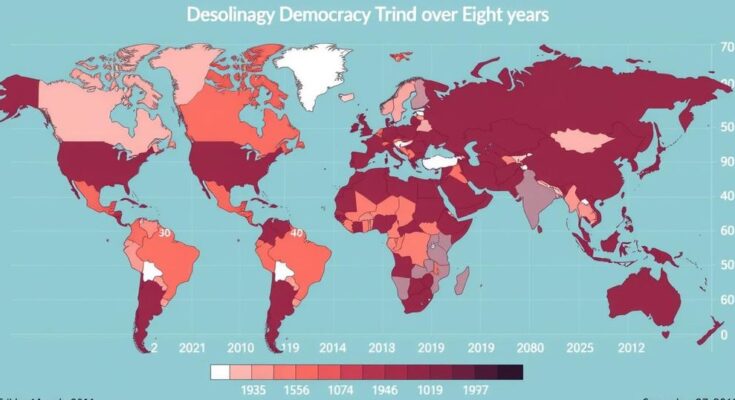The International Institute for Democracy and Electoral Assistance reports that democracy has declined for the eighth consecutive year globally. Key findings include reduced voter turnout, increased election disputes, and threats to electoral integrity from disinformation and government interference. Regions such as Africa and Europe are experiencing notable challenges, while some improvements are seen in a few countries. The need for proactive measures to restore democratic values is critical.
Democracy has witnessed a significant decline globally for the eighth consecutive year, according to the International Institute for Democracy and Electoral Assistance (International IDEA). In their recent report, the organization highlighted the concerning trend of deteriorating credible elections and parliamentary oversight, attributing this decline to factors such as government intimidation, foreign interference, disinformation campaigns, and the misuse of artificial intelligence in political contexts.
The report detailed that election credibility has diminished markedly, with voter turnout decreasing from 65.2% in 2008 to a mere 55.5% in 2023. Alarmingly, one in three elections now faces some form of dispute, underscoring a growing crisis in electoral integrity worldwide. “Elections remain the single best opportunity to end democratic backsliding and turn the tide in democracy’s favor,” remarked Kevin Casas-Zamora, Secretary-General of International IDEA.
According to the study, nearly 47% of countries assessed have shown declines in vital democratic indicators over the past five years, confirming the ongoing trend of global democratic regression. Reports indicated that almost 20% of election outcomes since 2020 have been contested, with equal numbers decided through judicial appeals. The year 2023 has been characterized as the worst for free and fair elections and effective parliamentary monitoring.
In Africa, despite overall stability in democratic performance, significant setbacks are seen in nations such as Burkina Faso, where military coups have led to power shifts. Conversely, improvements have been noted in countries like Burundi and Zambia. Likewise, in Western Asia, a significant portion of nations displayed poor democratic performance. Europe has also seen a notable regression in rule of law and civil liberties, although positive developments have emerged in Montenegro and Latvia.
The Americas have largely retained democratic stability; however, countries like Guatemala, Peru, and Uruguay have experienced declines regarding rule of law and civil liberties. The Asia-Pacific region has shown minor declines with notable advancements in Fiji, the Maldives, and Thailand. Yet, situations in Afghanistan and Myanmar highlight severe democratic setbacks, with ongoing conflicts affecting civic freedoms and government legitimacy.
Overall, these findings present a grave picture of the current state of democracy around the world, suggesting a critical need for intervention to restore and uphold democratic values and processes.
The article addresses the global decline of democracy, spanning eight years as reported by the International IDEA, an organization committed to promoting democratic practices. The decline is characterized by a marked decrease in electoral integrity, governmental oversight, and voter participation, alongside threats from various external and internal forces. The emphasis on statistics, regional analysis, and specific country examples provides a comprehensive view of the challenges facing democracy today. It is essential to understand the factors contributing to these declines, including increased disinformation, the role of governments, and the impact of global politics on democratic processes. This context is vital to inform discussions about potential solutions and reforms necessary to reverse the current trends of democratic erosion, as detailed in the report.
In conclusion, the ongoing decline of democracy worldwide for the eighth straight year poses significant challenges to electoral integrity and civic engagement. The International IDEA’s findings reveal alarming trends of government interference and diminished voter turnout, calling for urgent action to rectify these issues. The report underscores the necessity of effective electoral processes as a cornerstone of maintaining democratic values and accountability, emphasizing the critical role elections play in reversing negative trends in democracy. As such, continued vigilance and efforts to enhance the democratic framework are essential to protecting fundamental rights and freedoms globally.
Original Source: apnews.com




